
|

|
Forum Index : Microcontroller and PC projects : IO speed, basic vs cfunction
| Author | Message | ||||
| cwilt Senior Member Joined: 20/03/2012 Location: United StatesPosts: 147 |
I just got my sample 170 chips to play with and have loaded the latest beta successfully. So far everything seems to be as expected. Today I was playing around and did a simple loop that toggled a pin on and off. The speed was not surprising but it did raise a question for me that I do not yet know how to answer. Since I have not had a chance to play with and learn the cfunctions I will ask those who do know. Has anyone created cfuntions to turn a pin on or off and measured the speed compared to the normal way? I think 3 functions would do it. A set high, set low, and a toggle would do the trick. If you know how to write the code but don't have the means to measure. Post it and I will run the tests. Curiosity killed the cat, but it died a wiser cat. |
||||
TassyJim Guru Joined: 07/08/2011 Location: AustraliaPosts: 6469 |
I think that the overheads in calling the Cfunction would make any simple toggle much the same as a normal function doing the same think. Where Cfunctions would be of benefit would be for a stream of short, varying length pulses. Jim VK7JH MMedit |
||||
| G8JCF Guru Joined: 15/05/2014 Location: United KingdomPosts: 676 |
@cwilt As part of developing MMProg32RPCII, I have to toggle a pin for a clock pulse, and according to my 'scope, without any delays between high and low, the pulse width was about 100nS (at CPU=48) wide. Here's some test code OPTION EXPLICIT PIN(6) = 0 SETPIN 6,DOUT 'PulseTest NEVER returns, Cycle Power 'Scope/Counter on Pin 6 of 28 pin uMite DIM Result% Result%=pulsetest() END ' 'K:\Programming\PICProgramming\Micromite\UserSupport.X\dist\ default\production\pulsetest.bas ' 'pulsetest 2014-12-08 06:50:28 CFuncGen Ver 1.0.21 by user=Peter ' CFUNCTION pulsetest 00000000 3c03bf88 24020004 ac626138 ac626134 1000fffd 00000000 END CFUNCTION '#define clklo *(volatile unsigned int *)0xbf886134 = (1 << 2) // pin 6 Low '#define clkhi *(volatile unsigned int *)0xbf886138 = (1 << 2) // pin 6 High 'long long pulsetest(){ ' ' //Do Forever ' for(;;){ ' clkhi; ' clklo; ' } '} Not quite what you want, sorry I didn't read your post properly - mea culpa - I'll write what you want - but this test does show the limit on pulse generation. Jim is quite correct, unless you need to generate a pulse train, the overhead in calling the CFunction dwarfs the C execution time. Peter The only Konstant is Change |
||||
| G8JCF Guru Joined: 15/05/2014 Location: United KingdomPosts: 676 |
@CWilt I think these are the functions you want, and presumably you will write some MMBasic around them. Hope these will help answer your questions. OPTION EXPLICIT DIM I%,J%,R% 'Scope/Counter on Pin 6 of 28 pin uMite PIN(6) = 0 SETPIN 6,DOUT DO INPUT "Test to Run, 1=Set High, 2=Set Low, 3=Pulse, 4=Pulse train", I% SELECT CASE I% CASE 1 FOR J%=1 TO 10000 R%=PulseHi() NEXT J% CASE 2 FOR J%=1 TO 10000 R%=PulseLo() NEXT J% CASE 3 FOR J%=1 TO 100000 R%=Pulsetest() NEXT J% CASE 4 'PulseTest NEVER returns, Cycle Power 'Scope/Counter on Pin 6 of 28 pin uMite PRINT "You will need to power cycle your uMite after this" R%=pulsetrain() END SELECT LOOP END ' 'K:\Programming\PICProgramming\Micromite\UserSupport.X\dist\ default\production\pulsetrain.bas ' 'pulsetrain 2014-12-08 07:18:50 CFuncGen Ver 1.0.21 by user=Peter ' CFUNCTION pulsetrain 00000000 3c03bf88 24020004 ac626138 ac626134 1000fffd 00000000 END CFUNCTION ' 'pulseHi 2014-12-08 07:18:50 CFuncGen Ver 1.0.21 by user=Peter ' CFUNCTION pulseHi 00000000 24030004 3c02bf88 ac436138 00001021 03e00008 00001821 END CFUNCTION ' 'pulseLo 2014-12-08 07:18:50 CFuncGen Ver 1.0.21 by user=Peter ' CFUNCTION pulseLo 00000000 24030004 3c02bf88 ac436134 00001021 03e00008 00001821 END CFUNCTION ' 'pulseTest 2014-12-08 07:18:50 CFuncGen Ver 1.0.21 by user=Peter ' CFUNCTION pulseTest 00000000 3c02bf88 24030004 ac436138 ac436134 00001021 03e00008 00001821 END CFUNCTION '#define clklo *(volatile unsigned int *)0xbf886134 = (1 << 2) // pin 6 Low '#define clkhi *(volatile unsigned int *)0xbf886138 = (1 << 2) // pin 6 High 'long long pulsetrain(){ ' ' //Do Forever ' for(;;){ ' clkhi; ' clklo; ' } '} ' 'long long pulseHi(){ ' clkhi; ' return(0); '} ' 'long long pulseLo(){ ' clklo; ' return(0); '} ' 'long long pulseTest(){ ' clkhi; ' clklo; ' return(0); ' Peter The only Konstant is Change |
||||
| cwilt Senior Member Joined: 20/03/2012 Location: United StatesPosts: 147 |
Thats what I thought would be the case, but you never know until you ask or try yourself. Would be cool to have access to fast IO. |
||||
| cwilt Senior Member Joined: 20/03/2012 Location: United StatesPosts: 147 |
Thats considerably faster than standard functions. Yours and Jim's opinions are more than enough for me. |
||||
| cwilt Senior Member Joined: 20/03/2012 Location: United StatesPosts: 147 |
Thanks a lot Peter. I will write some simple code and post the results in case someone else asks such a silly question. |
||||
| G8JCF Guru Joined: 15/05/2014 Location: United KingdomPosts: 676 |
@cwilt It wasn't/isn't a 'silly question'. A properly characterised set of test results would be very useful to the Community. I don't really have the proper test equipment to be able to easily carry out rigorous testing and recording of the results, (need a DSO IMHO), eg at each of the CPU speeds. Peter The only Konstant is Change |
||||
| cwilt Senior Member Joined: 20/03/2012 Location: United StatesPosts: 147 |
I recently did similar testing on a linux SoC device that I use. Typical programming of the IO's is done in C and a lot of people struggle with C, especially those new to programming in general. So I wrote the fastest possible IO control code for many different interpreted languages and compared them to compiled C. I expected them all to be very similar and I proved myself wrong. I will proceed with the tests at each CPU speed and post the results. |
||||
| cwilt Senior Member Joined: 20/03/2012 Location: United StatesPosts: 147 |
Test results. Basic samples first. Used a simple loop with pin on and off. CPU=5mhz IO speed=1.2khz pulse=808us 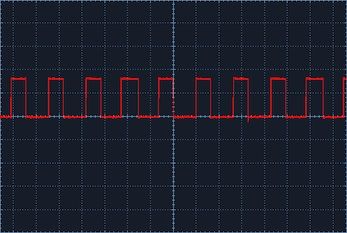
CPU=10mhz IO speed=2.5khz pulse=392us 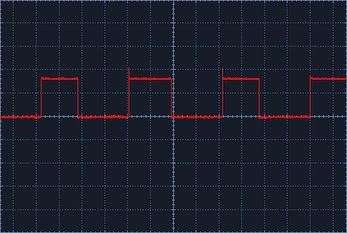
CPU=20mhz IO speed=5.2khz pulse=192us 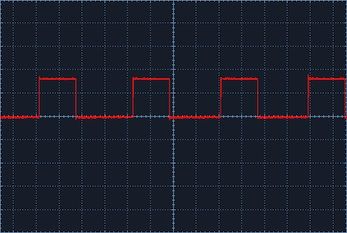
CPU=30mhz IO speed=7.8khz pulse=128us 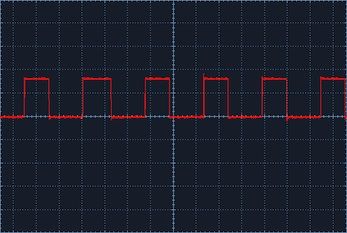
CPU=40mhz IO speed=10.4khz pulse=96us 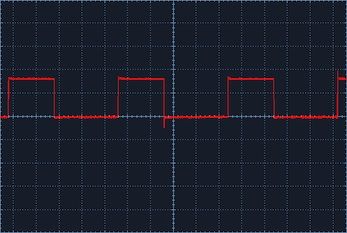
CPU=48mhz IO speed=12.5khz pulse=80us 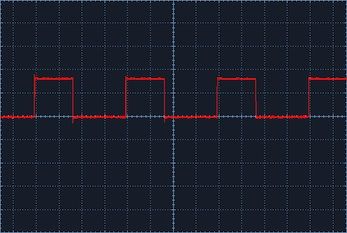
|
||||
| cwilt Senior Member Joined: 20/03/2012 Location: United StatesPosts: 147 |
Cfunction using Peters pulsetrain. Thanks again for the code. CPU=5mhz IO speed=1.25mhz Pulse=0.797us 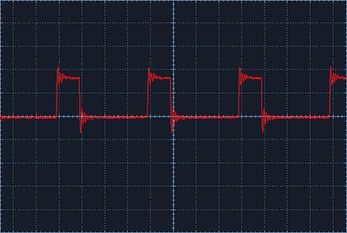
CPU=10mhz IO speed=2.5mhz Pulse=0.399us 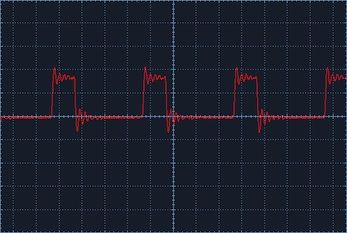
CPU=20mhz IO speed=5.0mhz Pulse=0.199us 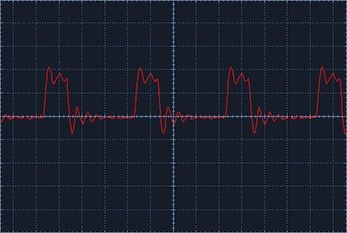
CPU=30mhz IO speed=7.5mhz Pulse=0.133us 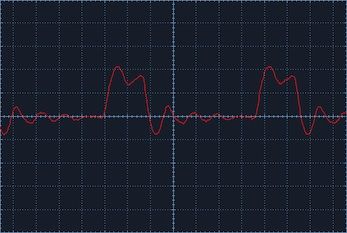
CPU=40mhz IO speed=10.0mhz Pulse=0.100us 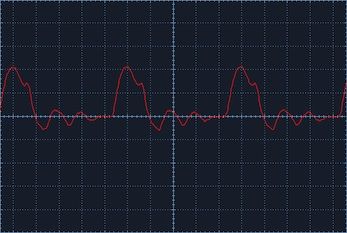
CPU=48mhz IO speed=12.0mhz Pulse=0.083us 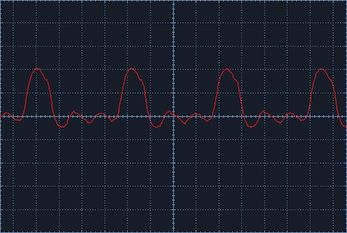
|
||||
| cwilt Senior Member Joined: 20/03/2012 Location: United StatesPosts: 147 |
These images are 1/2 scale. I will upload full size if asked. |
||||
| G8JCF Guru Joined: 15/05/2014 Location: United KingdomPosts: 676 |
@cwilt Thanks, that's an interesting set of observations and are a good basis for anyone planning on needing fast digital I/O. Peter The only Konstant is Change |
||||
| cwilt Senior Member Joined: 20/03/2012 Location: United StatesPosts: 147 |
@Peter, Yes, indeed. I think that with cpu at default speed and some timing control a nice square wave could be made at at around 5mhz. |
||||
| G8JCF Guru Joined: 15/05/2014 Location: United KingdomPosts: 676 |
I wonder how difficult it would be to produce a tunable quadrature (I/Q) clock from 2 pins for a low frequency SDR ? Peter The only Konstant is Change |
||||
| cwilt Senior Member Joined: 20/03/2012 Location: United StatesPosts: 147 |
Fun idea. |
||||
| The Back Shed's forum code is written, and hosted, in Australia. | © JAQ Software 2026 |